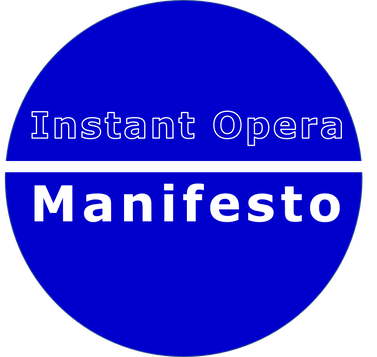Towards a Shared Understanding of a New Form
Some notable exceptions notwithstanding, no art form is as overtly elitist and as inherently imperialist as opera. At the same time, through the combination of sound/music, art/drama, performance/acting and movement/dance, opera offers artists of all stripes and colours a shared canvas that is potentially larger and a collaborative platform that is potentially richer and more diverse than any other.

As our fundamental freedoms and human rights increasingly come under serious and sustained attack, our democracies are on the retreat and authoritarianism is on the rise globally, opera must reinvent itself, free itself of its imperialist traditions, so that we can realise its full potential as a contemporary cultural force for good. For this to happen, we need to start thinking and practicing opera differently. We must do away with entrenched social and cultural conventions, with big budgets, large stage sets and long rehearsal periods. In other words, we need to free opera from constraints artists have no control over and reconstitute it as a popular practice.
We call this new practice instant opera. It puts the means of cultural production where they belong, namely at the artist’s disposal. Whilst instant opera comes with its own set of constraints, it allows artists to create autonomously works of great beauty that only ever exist in the here and now, works that are always provisional, yet final, that are partial, yet complete, and that come into being instantaneously, whenever we come together as equals to practice our art collaboratively.
As a self-governing interdisciplinary practice, instant opera is neither intrinsically nor exclusively linked to any particular type of institution or target demographic and instead occupies underutilised or overlooked spaces to reach new audiences. Instant opera is a relational practice, where performers negotiate their relationship to the work, to each other and to their audience during performance each time anew, and in so doing co-create unique temporary works of ‘living art’.
Instant opera differs from other live art performance practices in that it implies a shared approach, text and/or score and often involves a director, writer, composer and/or conductor. Whilst rehearsals are kept to a minimum (a few hours at most), instant opera requires participants to practice their ‘parts’ independently beforehand, learn their lines etc, so that everyone enters each collaboration fully prepared. Given its impromptu nature, not all scores and texts/scripts lend themselves to be presented as instant opera and hence may need to be adapted, if not rewritten entirely. Over time, this will create a new genre with its very own repertoire of works.
Part gig, part happening, instant opera has the potential to decolonise opera, by limiting unwanted outside influences, while unbounding collective creativity, to democratise opera, by opening new spaces and reaching new audiences, and to transform opera, by shortening production cycles and facilitating risk-taking.
The opera is dead. Long live the opera.
Nicodemus, 03 May 2023
// feed
Conceived by Nicodemus and written by Stacy Dorgan Bentz, FEED, our first ever instant opera, is now scheduled for publication in book-form for June 2024. First live readings, where we intend to set the work to Dr NoJoke’s distinct techno beats, are planned for later in the year.
// Annotation
Over the next couple of months, we will be reaching out to practitioners across the arts to seek feedback on the Instant Opera Manifesto. If the idea resonates with you, we would love to hear from you as we are looking for opinion pieces on the subject and will be inviting selected authors to contribute to our podcast series (also streamed live on youtube) later in the year.
To get in touch, please use in the first instance the contact form provided here.
